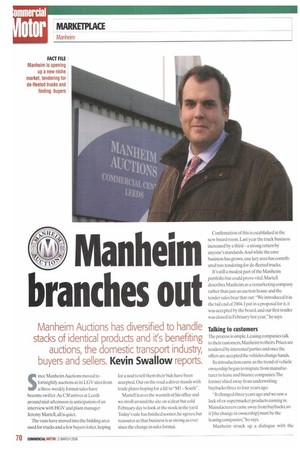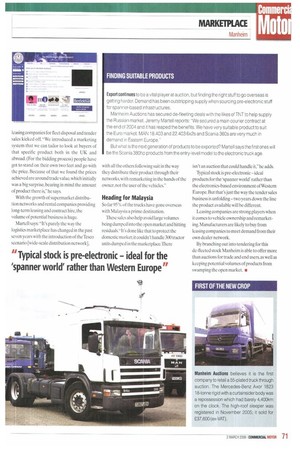Manheim branches out
Page 70

Page 71

If you've noticed an error in this article please click here to report it so we can fix it.
Manheim Auctions has diversified to handle stacks of identical products and it's benefiting auctions, the domestic transport industry, buyers and sellers. Kevin Swallow reports.
Since Manheim Auctions moved to fortnightly auctions at its LGV sites from a three-weekly format sales have become swifter. As CM arrives at Leeds around mid-afternoon in anticipation of an interview with HGV and plant manager Jeremy Martell, all is quiet.
The vans have moved into the bidding area used for trucks and a few buyers loiter, hoping for a nod to tell them their bids have been accepted. Out on the road a driver stands with trade plates hoping for a lift to "Ml —South".
Martell leaves the warmth of his office and we stroll around the site on a clear but cold February day to look at the stock in the yard. Today's sale has finished sooner. he agrees, but reassures us that business is as strong as ever since the change in sales format. Confirmation of this is established in the new board room. Last year the truck business increased by a third — a strong return by anyone's standards And while the core business has grown, one key area has contributed too: tendering for de-fleeted trucks.
It's still a modest part of the Manheim portfolio but could prove vital. Martell describes Manheim as a remarketing company rather than just an auction house and the tender sales bear that out."We introduced it in the tail end of 2004.1 put in a proposal for it.it was accepted by the board, and our first tender was closed in February last year," he says.
Talking to customers
The process is simple. Leasing companies talk to their customers Manheim to theirs. Prices are tendered by interested parties and once the offers are accepted the vehicles change hands.
Its introduction came as the trend of vehicle ownership began to migrate from manufacturer to lease and finance companies.'The former shied away from underwriting buybacks three to four years ago.
"It changed three years ago and we saw a lack of ex-supermarket products coming in. Manufacturers came away from buybacks, so it [the change in ownership] must be the leasing companies," he says.
Manheim struck up a dialogue with the leasing companies for fleet disposal and tender sales kicked off. "We introduced a marketing system that we can tailor to look at buyers of that specific product both in the UK and abroad. (For the bidding process) people have got to stand on their own two feet and go with the price. Because of that we found the prices achieved are around trade value, which initially was a big surprise, bearing in mind the amount of product there is," he says.
With the growth of supermarket distribution networks and rental companies providing long-term leasing and contract hire, the volume of potential business is huge.
Martell says: "It's purely the way the logistics marketplace has changed in the past seven years with the introduction of the Tesco scenario [wide-scale distribution network], with all the others following suit in the way they distribute their product through their networks, with remarketing in the hands of the owner, not the user of the vehicles."
Heading for Malaysia Su far 95% of the trucks have gone overseas with Malaysia a prime destination.
These sales also help avoid large volumes being dumped into the open market and hitting residuals.-It's done like that to protect the domestic market: it couldn't handle 300 tractor units dumped in the marketplace:There isn't an auction that could handle it," he adds.
Typical stock is pre-electronic — ideal products for the 'spanner world' rather than the electronics-based environment of Western Europe. But that's just the way the tender sales business is unfolding— two years down the line the product available will be different.
Leasing companies are strong players when it comes to vehicle ownership and remarketing. Manufacturers are likely to buy from leasing companies to meet demand from their own dealer network.
By branching out into tendering for this de-fleeted stock Manheim is able to offer more than auctions for trade and end users, as well as keeping potential volumes of products from swamping the open market. •
















































































































































































































